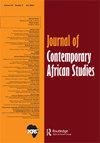Migrant Chiefs in Stranger Communities in Ghana: The Challenge of their Inclusion into the Houses of Chiefs
IF 0.8
Q2 AREA STUDIES
引用次数: 0
Abstract
Urbanization spearheaded migratory movements into African towns and cities, while democratization provided migrants the social and political space to establish traditional authority in the form of migrant chieftaincy. This paper focuses on this type of chieftaincy; variously called migrant chiefs, Zongo Chiefs, or stranger chiefs in settler communities, and the quest for these chiefs’ inclusion into the Houses of Chiefs structure, statutory bodies which are being constitutionally guaranteed. Historical evidence points to the fact that both the colonial and postcolonial state have shown some level of tolerance to migrant chiefs in Ghana. While political leaders, such as the executive arm, have given recognition to these chiefs at various levels, including granting them a complete Ministry, these chiefs still find it difficult to be included as members of the Houses of Chiefs. Using historical and anthropological material, the paper provides the foundation of migrant chieftaincy in Ghana, while utilizing empirical data to analyse how migrants reinvent chieftaincy in the urban centres, and their attempts to incorporate such an institution into the Houses of Chiefs. The paper argues that, having the support of the political leaders of the state is not enough to guarantee migrant chiefs’ inclusion into the Houses of Chiefs, and that judicial and legislative policies are equally needed to facilitate the process of inclusion.加纳陌生社区的移民酋长:他们融入酋长家族的挑战
城市化引领了向非洲城镇的移徙运动,而民主化则为移徙者提供了以移徙酋长形式建立传统权威的社会和政治空间。本文主要研究这种类型的酋长制;被称为移民酋长,Zongo酋长,或移民社区的陌生人酋长,以及寻求将这些酋长纳入酋长院结构,这是宪法保障的法定机构。历史证据表明,殖民和后殖民国家都对加纳的移民酋长表现出一定程度的宽容。虽然政治领导人,如行政部门,在各级承认这些酋长,包括授予他们一个完整的部,但这些酋长仍然很难被列入酋长院的成员。利用历史和人类学材料,本文提供了加纳移民酋长制度的基础,同时利用经验数据分析移民如何在城市中心重塑酋长制度,以及他们将这种制度纳入酋长院的尝试。本文认为,获得国家政治领导人的支持不足以保证移民酋长被纳入酋长院,司法和立法政策同样需要促进纳入过程。
本文章由计算机程序翻译,如有差异,请以英文原文为准。
求助全文
约1分钟内获得全文
求助全文
来源期刊

Journal of Contemporary African Studies
AREA STUDIES-
CiteScore
2.20
自引率
0.00%
发文量
18
期刊介绍:
Journal of Contemporary African Studies (JCAS) is an interdisciplinary journal seeking to promote an African-centred scholarly understanding of societies on the continent and their location within the global political economy. Its scope extends across a wide range of social science and humanities disciplines with topics covered including, but not limited to, culture, development, education, environmental questions, gender, government, labour, land, leadership, political economy politics, social movements, sociology of knowledge and welfare. JCAS welcomes contributions reviewing general trends in the academic literature with a specific focus on debates and developments in Africa as part of a broader aim of contributing towards the development of viable communities of African scholarship. The journal publishes original research articles, book reviews, notes from the field, debates, research reports and occasional review essays. It also publishes special issues and welcomes proposals for new topics. JCAS is published four times a year, in January, April, July and October.
 求助内容:
求助内容: 应助结果提醒方式:
应助结果提醒方式:


